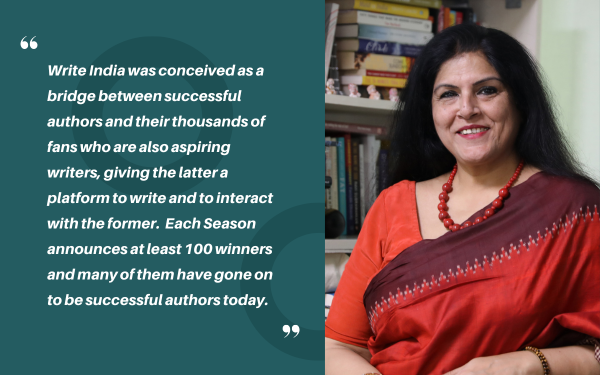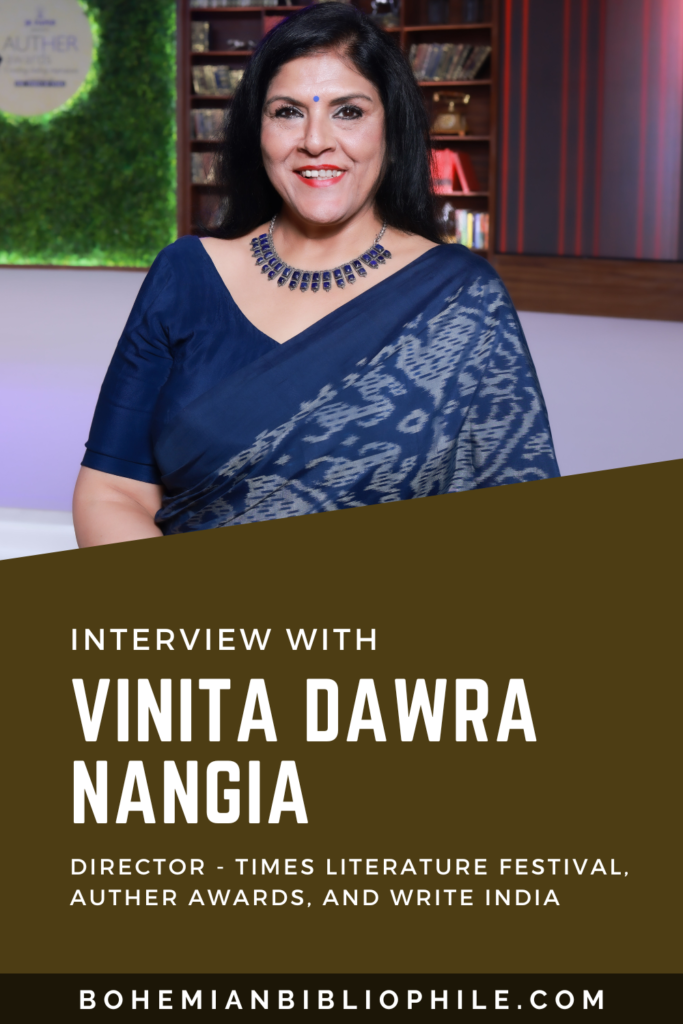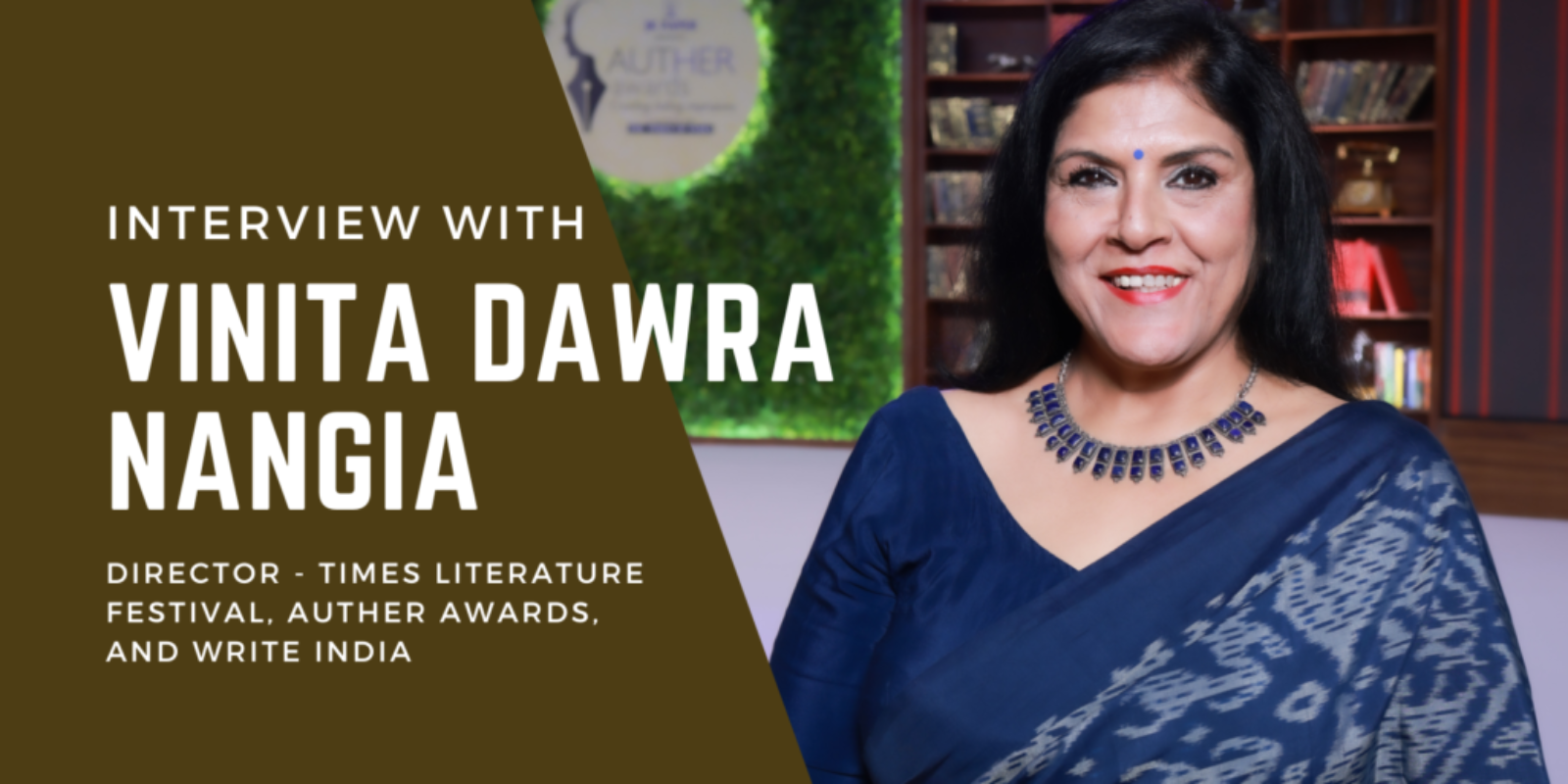Distinguished editor and author Vinita Dawra Nangia is a powerhouse! Executive Editor with The Times of India. Festival Director of the Times Literature Festival. Director of AutHer Awards, India’s most coveted women author awards. Director/Founder of Write India, the world’s largest crowd-sourced short story contest.
Her popular Sunday column in the Times of India, ‘O-zone’ reflects incisive insights into life, relationships, and is an ongoing commentary on contemporary living. Her books include the bestselling It’s Your Life: Reflections on Contemporary Living & Relationships, Love is Always Right & Other Musings and Fashion Fair: The Journey of 13 Contemporary Designers.
I had the privilege of interviewing her for Bohemian Bibliophile. She discussed the literary ventures she leads for the Times, literary festivals, publishing, writing, and the question everyone’s asking – will AI replace writers?
You spearhead The Times Literature Festival, the AutHer Awards as well as Write India. How do you maintain the consistency and quality of such vast literary ventures?
Good energy and positivity, along with a sharp focus on books, speakers’ panels and scheduling. We keep abreast of developments in the publishing sector and stay connected to publishers and authors. The sheer unfiltered energy that we bring to the festival ensures that the result will be a resounding success. We strive to give each author and publisher personal attention. Personally, I make sure that I move from hall to hall all the time on the days of the Festival to ensure that everything is running with clockwork precision. Our focus is literature, and we offer author interviews, panel discussions and workshops – we do not foray into shopping, entertainment unrelated to writing, etc. Most authors tell me that they appreciate the unique, welcoming warmth of the Times Literature Festival and the vibrant energy they witness here as opposed to the dispassionate, almost impersonal atmosphere at most other festivals. We pay a lot of attention to the selection of authors, topics of discussion and the anchors for every session. It is always in the smaller details that the success of any project lies.
The world’s largest crowd-sourced story contest, Write India has had three successful seasons. Please share with us how it came into being and how it has evolved.
Write India was conceived as a bridge between successful authors and their thousands of fans who are also aspiring writers, giving the latter a platform to write and to interact with the former. Every month of the Season, an established author shares a prompt, which is then used as part of short stories written by participants. Thousands of short stories pour in, and we filter through these to come to the best of the lot, from which the celebrity author helps us pick the Top 10. We have been lucky to have had amongst our Write India authors some renowned national and international names – Ruskin Bond, Amish, Jeffrey Archer, Salman Rushdie, Chetan Bhagat, Anita Nair, Clare Macintosh, Sudha Murthy, and many others. Each Season announces at least 100 winners and many of them have gone on to be successful authors today. I am very proud of my Write India family.
How has the literary scene evolved over the last few years?
Books have flooded the market and it becomes difficult to choose the ones that are worth reading. It is good to note that so many people are getting an opportunity to write and be published, but the exclusivity and mystique associated with authors and readers is a thing of the past now. Everyone writes, everyone reads. Everything. Genres have expanded and split several times over. Once in a while, a really good book comes along, but mostly these get lost in the din of marketing the rest. Literary fiction has taken a bad knock while self-help books, thrillers, and children’s books flood the market.
How have literary festivals and awards helped the Indian book market and publishing industry to grow?
Literature festivals keep the excitement around reading and writing going, with the possibility of meeting your favourite authors face to face and hearing them talk. Awards are a great way to encourage authors as publishing has traditionally been an industry whose heroes have not been seen really, and rarely acknowledged. I would urge for the existence of more literary festivals and awards in smaller towns too so that the authors of these regions get their due recognition and are able to interact with their readers, thereby further encouraging the habit of reading and writing. JK Paper-TOI AutHer Awards are an attempt to encourage women authors to write more and better with the promise of recognition every year. Write India too is at its heart an attempt towards the same direction – to push people to read and write more!
What difference do you see in the new generation of writers that you have helped bring to the forefront of events and conversations?
Writers today take the business of writing and marketing their books very seriously. They do not shy away from pushing their products and ensuring that these reach the right quarters. They also do not hesitate in experimenting with various genres in the hope of gaining success as an author. Sadly, I do not think they are as well-read as the generations of writers that have come earlier.

Your weekly column O-zone has continued to inspire writers and readers over the decades. Please share with us your own writing journey.
O-zone has been one of life’s blessings. This column has taught me, honed me, and helped me evolve like nobody and nothing else. Writing this column has been a cathartic, spiritual experience for me, wherein I have connected with my soul, and through that with the Universal Spirit to write on life’s quandaries and the science of relationships. The column has touched so many people’s lives even though it has never been promoted or marketed. It has a monumental following, the size and reach of which never ceases to amaze me. O-zone has been a Guru for me, because it makes me think, reflect, write and then reach out to provide solace to others. It is a great spiritual experience for me in many ways and helps me connect with God.
Every author wants their next book to be a best seller or optioned for a movie/series. How has the business of writing affected the quality of writing?
True, most writers today start off to write a bestseller, not a book. And the word “bestseller” is so loosely used that it has ceased to hold any meaning. When you are not writing what comes from deep within you, but only to cater to an audience, then you are commodifying writing. How can such writing ever have the mystique, the magic, the relatability that makes for good literature? The best writing is always the one that an author does for his own self – not for anyone else, not even for your readers. The fact that it gets read and appreciated, is incidental. When quantity increases, quality is bound to take a blow. But there will always be good writers – it is always a pleasure to discover such an author!
What are your thoughts on self-published books? Although sometimes the quality may not be at par, they seem to be quite popular with the readers.
Chetan Bhagat became a sensation overnight because he wrote relatable stories in language that was easily understood by all. Chetan himself has no doubts on that and says his dream is that every child in every slum should read at least one book. What a laudable dream! Everyone who writes has the right to dream of having a published book one day. Publishing houses can print only a limited number of books, else it doesn’t make business sense. So, the next best thing is to self-publish, since that option is available today. My only hope would be that every book must go through a round of good editing before being sent to press. After that, I do firmly believe that every book has a life of its own – let it fly!
Is it true that there are more writers than readers in India? In times of multiple entertainment avenues, are people still reading? What are your thoughts?
I honestly find many more people reading today than earlier. Everyone is reading all the time, are they not? On their cellphones, iPad, laptops! The means of reading may have changed. It may not be just books they read all the time, but what reassures me is that they are reading and writing, nevertheless. Also, the written word is available to many more people today than ever before through devices that are easily available – even their cellphones. Ebooks and Audio books ensure the increased reach of books. Books, movies and web shows merge in such a manner that you cannot escape literature and stories.
Last but not least, a question everyone is asking. In this era of ChatGPT, anyone can be an author. What is the future of writers and writing?
The only true writing is the one that comes from the depths of your being. AI may be able to generate writing, even good writing, but I bet what will be missing is the human connect, the elements that reach out and are relatable. Having said that, let’s wait and see. Never say never! But if you mean that people will be able to pass off writing by AI as their own, I am sure soon there will be ways to detect that.
Follow Vinita Dawra Nangia on O-Zone, Instagram, and Twitter. Check out her bestselling books.
Many thanks to Jyoti Jha, a noted author herself, for the opportunity and guidance. Couldn’t have done it without you.

This blog post is part of the blog challenge ‘Blogaberry Dazzle’ hosted by Cindy D’Silva and Noor Anand Chawla in collaboration with Zariya Healings.


June 15, 2023 @ 5:14 pm
Hi Ritu. I really enjoyed reading this interview.
/When you are not writing what comes from deep within you, but only to cater to an audience, then you are commodifying writing. /
This answer will stay with me forever.
August 13, 2023 @ 7:51 pm
I hoped you would, Sonia. The quote is the absolute truth. Thank you for stopping by. 😊
June 16, 2023 @ 8:06 pm
A very interesting interview, glad to know that readership has increased and I agree that we have so many avenues now which weren’t there earlier. The last question really stole the show for me, I know we should say never but nothing can replace the human touch I feel.
August 13, 2023 @ 7:52 pm
Exactly Manisha. AI can write pages upon pages based on curated content but cannot write experiences.
June 17, 2023 @ 12:00 pm
I always enjoyed reading Vinita Dawra Nangia’s columns in TOI even as a kid. Your interview with the Founder of Write India, the world’s largest crowd-sourced short story contest, was very insightful. She is still as relevant as twenty years back in the literary world. Move aside ChatGPT, authors will continue to rule!
August 13, 2023 @ 7:54 pm
Absolutely Preeti. She is such an inspiration.
June 17, 2023 @ 5:23 pm
Thats a brilliant session you had with Vinita mam. Ritu the session turned interesting and worthy for me , for 2 things… First the questions you asked are appropriate and targeted to highlight the current scenario of the literary world. Second the answers given my mam bring under limelight some important facts which i was not aware about….. Increase in readership… I was in a dilemma that there is a acute need of quality writer but from mam got to know that there is increase in readership… Very interesting session indeed.
August 13, 2023 @ 7:57 pm
Thank you, Samata. 😊 I agree with Vinita mam that there is no dearth of good writing but the fact that we need to support quality writing more.
June 18, 2023 @ 9:12 am
She has come out with some hard-hitting truths. Literary fiction has really gone down. I also find authors don’t read a lot. And there is the tendency to write for OTT rather than a reader. However, it’s exciting to see the rise in children’s literature. I really enjoy those books. I did get AI to write a story, and it is good, but not heart-touching.
August 13, 2023 @ 8:03 pm
True that, Ambica. I feel one can sense if the writer is writing from the heart or out to create the next bestseller. As for writers not being readers, it does reflect in the quality of writing.
June 18, 2023 @ 9:58 am
Wow, Ritu! It’s incredible that you interviewed Vinita Nangia. I’ve been a long-time follower of hers, and your interview was refreshingly honest and genuine. As she mentioned, people are indeed reading more nowadays, and I wholeheartedly agree. While I may not indulge in books per se, I consume a substantial amount of content in other forms. Vinita’s insight on AI-written articles being detectable resonates with me, especially considering the multitude of apps available for identifying AI-generated content. So far, I’ve only attended one Litt fest, but I’m eagerly looking forward to attending more in the near future.
June 18, 2023 @ 4:10 pm
What an interview, and its good to know where writing had reached to from then to now. Enjoyed the read.
June 18, 2023 @ 4:35 pm
Very interesting interview. I also enjoy reading her column. I thought people are reading less these days. But she is right. It may not be books but people are still reading.
June 18, 2023 @ 6:37 pm
Felt so good reading the interview Ritu. She sounds so genuine and much of what she says makes absolute sense. Loved some one liners here and there in her answers… they kinda like hit the bull’s eye.
June 18, 2023 @ 6:48 pm
The interview was really fascinating, and it’s great to hear that more people are reading nowadays. I agree that we now have many options available that didn’t exist before. What really stood out to me was the last question. Even though there’s a belief that people are reading less these days, I personally believe that nothing can truly replace the human connection I feel when reading. She is correct in saying that it might not always be through books, but people still engage in reading in different ways.
June 18, 2023 @ 8:05 pm
That was an insightful interview. The human element and reliability are the points that I would have with me. The best part is the best works come when the author writes for themselves.
June 18, 2023 @ 10:25 pm
Lots of interesting insights shared here by Vinita, and you deserve applause for asking some very pertinent questions. Writing from the heart matters more than being popular where quality is concerned. And yes, I hope AI written content can be detected soon!
June 18, 2023 @ 11:32 pm
Kudos for conducting such an insightful interview with Vinita Nangia. She is the lady who works hard for the upliftment of the budding writers. Hats off to her.
June 19, 2023 @ 12:42 am
That was such an intriguing interview Ritu! I love getting deeper insights from famous, well known persons. There’s something so magnetic in them and the same applies after reading this tete a tete!
June 19, 2023 @ 7:47 am
What an insightful interview session. Loved reading it
June 19, 2023 @ 10:08 am
Wow, this is truly amazing Ritu! I loved your questions the most. And she is such an inspiring personality.
June 19, 2023 @ 12:31 pm
Vinita is so inspiring. You have asked her very interesting questions; an amazing interview read,
July 6, 2023 @ 1:38 am
Must have been a proud and inspiring moment for you Ritu. Such a beautiful and interview and touches upon so many things that writers can benefit from. One should always find inspiration and joy in their writing as it is extremely personal. That is the difference between an author and a content writer.
August 13, 2023 @ 8:09 pm
A very interesting interview. She spoke well.